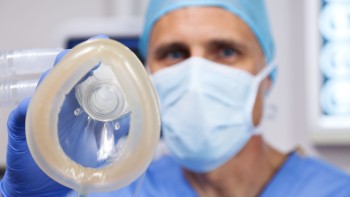Inguinal Hernia Surgery: cost, duration, and step by step

- Why is Inguinal Hernia Surgery performed?
- How long does it take an Inguinal Hernia surgery?
- How much does an Inguinal Hernia Surgery cost?
- Inguinal Hernia surgery: step by step
- Have you decided to go ahead with surgery? Make an appointment with Operarme
- Bibliography
- Source information
- Frequent Questions
Why is Inguinal Hernia Surgery performed?
- Inguinal Hernia surgery’s main goal is pain relief and eliminate any possibility of severe medical complications such as incarceration and/or the strangulation of the hernia.
- Inguinal hernia surgery’s duration will be determined by the technique performed and the severity of the hernia itself, among other factors.
- Whether performed laparoscopically or by open surgery, inguinal hernia surgery has very good results and a short recovery time.
If you find yourself reading this article about inguinal hernia surgery, it is likely that you or a close family member is suffering from this condition and you are seeking for more information.
As you have read previously, the main goal of this surgical intervention is fix the problem and the continuous pain for these following reasons:
- Eliminate the symptoms: which are basically pain and discomfort that prevent the patient from living a normal day-to-day life.
- Prevention: In this case, the aim is to avoid complications, such as incarcerated or strangulated hernia, which may require emergency surgery and, consequently, a more complex intervention.
In any case, it is possible to live with a hernia without feeling any discomfort or pain (asymptomatic hernia); however if symptoms appear, it is quite hard to carry on with a comfortable daily life with strong pain.
You can find in the following link an article about inguinal hernia complications (incarcerated or strangulated) so you can be aware of its consequences if not treated properly: Possible complications and risks of an inguinal hernia surgery
The first decision of having surgery or not for inguinal hernioplasty, laparoscopic or open surgery), is your general surgeon’s after assessing your case and your lifestyle habits. Once you’ve reached the point where you have to decide going ahead with surgical treatment, some questions may arise about the procedure.
You can find the most important facts you should know about this procedure in this article; however, we remind you that you can always contact us (without commitment) to ask for more information about this surgery or Operarme services.
How long does it take an Inguinal Hernia surgery?
One of the most frequently asked questions by patients in consultation with the General Surgeon is about the length of the surgery and the time admitted in the hospitaL.
A patient spends around 1-2 days admitted in the hospital after hernia surgery (however the days of admission varies depending on the hospital).
Time in the operating room
After arriving at the hospital and handing in all the necessary documentation at the admission desk, you will be escorted to a waiting room where you will wait a few minutes until you are called to enter the operating theatre. Before going in the operating room, you will first undress and put on your surgical clothes for the surgery and a line will be placed in your arm for anaesthesia (if you are interested in the subject of anaesthesia during inguinal hernia surgery, visit this article), and then you will go directly to the operating theatre where the surgeon, anaesthetist and assistants will be waiting for you.
Depending on the technique that will be performed for the removal of your hernia, duration of surgery time will vary:
- Open surgery for inguinal hernia: in this case, the duration of the surgery is 30-40 minutes, although it can be a little bit longer depending on the size of the hernia.
- Laparoscopic technique: in this case the recovery time is shorter, however it implies a longer duration of the intervention, lasting between 90 and 120 minutes.
Stay in the hospital
The hospital stay is the same for both types of inguinal hernia approach, 1 or 2 days, depending on each case, as there are occasions when the patient can go home the following day.
Having explained the duration of the surgical process, below you will find information on the price and costs of the surgery.
How much does an Inguinal Hernia Surgery cost?
When we talk about the cost of inguinal hernia surgery, we will take as a reference the fixed price of the service we provide at Operarme. We offer two different prices for this surgery, depending on whether it is performed with open surgical treatment or via laparoscopic technique:
- Open surgery for Inguinal Hernia: the cost is from 2.990 € and includes all the services necessary to perform the intervention in the safest way possible.
- Laparoscopic technique for inguinal hernia: the cost is from 3.890€, in this case the cost is higher since special equipment and instruments are required to perform this type of minimally invasive intervention.
When we state that our fixed prices are all-inclusive, we mean that all the services, elements, instruments and care is included in the cost of our surgeries:
- Pre-operative study, including blood tests, electrocardiogram and, if requested by the specialist, a chest X-ray.
- Medical and assistant fees until medical discharge.
- Anaesthetist's fees, anaesthesia and necessary medical gases.
- Stay in a private room with a spare bed for a companion, hotel and laundry services only for the patient for 1-2 days.
- Hygiene and care products for the patient, disposable and non-disposable, and food for the patient during the stay.
- Expenses related to the surgical procedure: Booking and use of the operating theatre, medical instruments, equipment, consumables and medications specific to the surgical procedure (not cytostatics or monoclonal antibodies or derivatives).
- Complementary tests during the hospital stay (analysis, electrocardiogram or chest x-ray).
- Post-surgical recovery room stay, monitoring and necessary treatments.
- Surgical mesh for hernia repair.
- Medical complications insurance, which covers possible eventualities such as the need for an extra day of hospitalisation. Learn more about this insurance service here
We also offer you the possibility of a transfer service to take you to the hospital on the day of admission, and from the hospital to your home on the day of discharge (you can read the conditions of the free transfer service here); as well as support and help of our patient service team, who will guide you and answer any concerns you may have, as well as managing the whole process so that you only have to worry about your health and getting better.
We remind you that you can request a free assessment consultation with one of our specialists to assess your case and treat your hernia problem as soon as possible.
Inguinal Hernia surgery: step by step
First of all, you book a surgical assessment consultation with one of our general surgeons, through our website.
You can ask for an appointment by clicking on the “Make an appointment” button, or filling our contact form here.
Once you have attended the appointment and the surgeon has confirmed the intervention and technique, our patient service team will contact you to inform you about the schedule and coming appointments of the patient’s surgical procedure.
The first step is to attend the preoperative appointment which consists of the following tests:
- Electrocardiogram: This test allows the doctor and anaesthetist to know the patient's cardiovascular health.
- Blood test: it is necessary to determine if there is any sign of infection, which would cause a delay in surgery until it is under control.
- Chest X-ray: This test is only performed if the doctor considers it appropriate and will ensure that there is no infection and that the trachea is correctly aligned, in case intubation is required.
Once you have completed the preoperative study and visited the anaesthetist to check the results from the previous tests, you will wait for surgery day.
On the day of admission, our Patient Service team will have handled and scheduled everything for you, and you will just have to go to the hospital with the required documentation and hand it over to the admission staff so they can start preparing you for the intervention.
These are the steps the surgeon takes to perform a Laparoscopic Inguinal Hernia Surgery:
- First of all, general anaesthesia will be given to the patient, meaning that the patient stays asleep throughout the procedure.
- The surgeon starts by disinfecting the area (usually the patient will have shaved it previous to the surgery) and makes between 2 and 4 small incisions in the abdominal cavity, where he/she will introduce the surgical instruments (remember that this surgery is minimally invasive).
- Next step, the surgeon will introduce a harmless gas into the cavity to enlarge it and improve visibility.
- The next step is to insert a laparoscopy into the area through one of these mini incisions. The laparoscope is an instrument that allows the surgeon to get a better view of the inside of the body on a monitor, and therefore removing the need of opening the patient.
- Through the laparoscope, the surgeon will repair the inguinal hernia from the inside, monitoring the whole process through a monitor connected to the laparoscope. The first step is to relocate the herniated tissue back inside, in order to repair the defect on the abdominal wall with the surgical mesh.
- The surgical mesh consolidates the abdominal wall and prevents the hernia from protruding again.
- Once the mesh is placed, the surgeon will reassure that the organs and structures in the area operated haven’t been damaged and then remove all the surgical instruments, laparoscope and gas from the body.
- Finally, the surgeon will place stitches and dressings in the incisions, and remove anaesthesia from the patient.
- At the end of the surgery, the patient will be taken to the recovery room to recover from the anaesthesia.
The intervention for Laparoscopic Inguinal Hernia Repair lasts between 90 and 120 minutes.
In the case of Open surgical treatment, these are the steps the surgeon takes to perform an Inguinal Hernia Surgery:
- Administration of general anaesthesia.
- Dilate the anus to access the highest part of the inflamed hemorrhoidal plexus, in order to completely remove the haemorrhoids.
- Clamp the hemorrhoidal veins with surgical forceps and remove the haemorrhoids with a laser.
- While the haemorrhoids are removed with the laser, the tissue is cauterised at the same time.
- The laser and the dilator are removed, finishing the intervention.
Inguinal Hernia Surgery lasts between 30 to 40 minutes.
The patient is then awakened, taken to the recovery room to fully recover from the anaesthesia and then taken to his or her room.
Regardless of the type of approach chosen for the surgery, one thing is clear, it will solve your hernia problem.
If you would like to know more about recovery from inguinal hernia surgery, visit the link below:
Have you decided to go ahead with surgery? Make an appointment with Operarme
If you are thinking of having surgery but don't know which doctor or hospital to go to, Operarme makes things easier for you by providing you with a free surgical assessment consultation.
You can meet our Specialist in General and Digestive Surgery in your city, tell him/her about your case, review your reports and medical tests, confirm that you require the intervention and together decide to solve the hernia problem once and for all.
If you need more information about how we work or the Specialist Surgeon we work with in your city, you can contact our Patient Service Team through our contact form, indicating your email address and telephone number.
You can also click below and request a surgical assessment consultation in just a few steps:

Do you need to assess your medical problem with an specialist?
Make an appointment with our specialist.
Bibliography
- Unidad de Cirugía Mayor Ambulatoria y Corta Estancia. Hospital Regional Universitario de Málaga. (2018, mayo). Hernioplastia inguinal abierta: técnica de Lichtenstein. Asacpharma. https://www.asacirujanos.com/admin/upfiles/revista/2018/Cir_Andal_vol29_n2_multimedia3.pdf
- Simons, M. P., Smietanski, M., Bonjer, H. J., Bittner, R., Miserez, M., Aufenacker, T. J., Fitzgibbons, R. J., Chowbey, P. K., Tran, H. M., Sani, R., Berrevoet, F., Bingener, J., Bisgaard, T., Bury, K., Campanelli, G., Chen, D. C., Conze, J., Cuccurullo, D., de Beaux, A. C., Wijsmuller, A. R. (2018). GUÍA INTERNACIONAL PARA EL MANEJO DE LA HERNIA INGUINAL. European Hernia Society, 22(1), 3–23. www.europeanherniasociety.eu/files/medias/cov13178_ehs_groin_hernia_management_a5_es_10_lr_0.pdf
Dr. Antonio Rebollo Marina
Médico Asistencial en Centro Médico Caser
Nº colegiado: 282834715

Medical disclaimer: All the published content in Operarme is intended to disseminate reliable medical information to the general public, and is reviewed by healthcare professionals. In any case should this information be used to perform a diagnosis, indicate a treatment, or replace the medical assessment of a professional in a face to face consultation. Find more information in the links below:
Frequent Questions
-
How is Inguinal Hernia surgery performed?
- An incision is made near the hernia and the hernia is located to separate it from the surrounding tissues.
- The hernia sac is removed or gently reinserted into the abdomen.
- The weakened abdominal muscles are closed with stitches and surgical mesh.
-
How long does Inguinal Hernia surgery take?
Generally, the duration for open inguinal hernia surgery is only 30 - 40 minutes.
-
How much does an Inguinal Hernia surgery cost?
The cost of Inguinal Hernia surgery in Operarme varies depending on the type of technique performed:
- Open Inguinal Hernia surgery - 2.990 €.
- Laparoscopic Inguinal Hernia surgery - 3.890 €.



